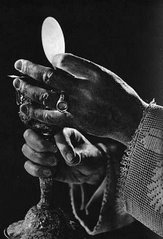“he can still be made to think of himself as one who has adopted a few new friends and amusements but whose spiritual state is much the same as it was six weeks ago. And while he thinks that, we do not have to contend with the explicit repentance of a definite fully, recognized, sin, but only with his vague, though uneasy feeling that he hasn’t been doing very lately.”
What’s happened to the patient then is very simple. He wasn’t watchful enough. Perhaps he was too concerned with the outward signs. The motions were the same and so he didn’t notice. As Mad-Eye Moody would say “CONSTANT VIGILANCE!” We need to be constantly checking ourselves and making sure we don’t slip. Just because our Mass attendance is the same, just because we say the daily prayers and do everything else that we normally do in our spiritual lives doesn’t mean that our spiritual lives aren’t changing. The roller coaster is constantly moving and will drop if we’re not careful.
When we get to the place that something’s wrong but we’re not fully aware of it, Screwtape has a very easy job. We have a tendency to not want to know what’s wrong. Instead,
“…you will find him opening his arms to you and almost begging you to distract his purpose and benumb his heart. He will want his prayers to be unreal, for he will dread nothing so much as effective contact with the Enemy. His aim will be to let sleeping worms lie.”
We never want to confront the full reality of sin. We don’t want to admit everyone is hurt by it and that we’re responsible. We certainly don’t want to admit that we’ve sinned against God. Yet that is what we have to admit if we are going to be cured. This is precisely why in the sacrament of Reconciliation we have to go to a priest. When we go face to face with another person, there is no doubt that the community is involved. We can’t just wish it away with “unreal prayers.” Instead, we have to say “Forgive me for I have sinned” and then say in the act of contrition “I have offended you my God.” This confrontation is necessary so that we fully die to our sinful selves. With this death, we can live again.
The other option is not very comforting:
“(In the patient’s attempts to avoid his guilt) You can make him do nothing at all for long periods. You can keep him up late at night, not roistering, but staring at a dead fire in a cold room. All the healthy and outgoing activities we want him to avoid can be inhibited and nothing given in return…The Christians describe the Enemy as ‘one without whom Nothing is strong.’ And Nothing is very strong: strong enough to steal away a man’s best years not in sweet sins but in a dreary flickering of the mind over it knows not what and knows not why…the only thing that matters is the extent to which you separate the man from the Enemy. It does not matter how small the sins are provided that their cumulative effect is to edge the man away from the Light and into the Nothing. Murder is no better than cards if cards can do the trick. Indeed the safest road to Hell is the gradual one-the gentle slope, soft underfoot, without sudden turnings, without milestones, without signposts.”
We need to keep our eyes on the road to make sure we’re not traveling down Screwtape’s road to hell.






No comments:
Post a Comment